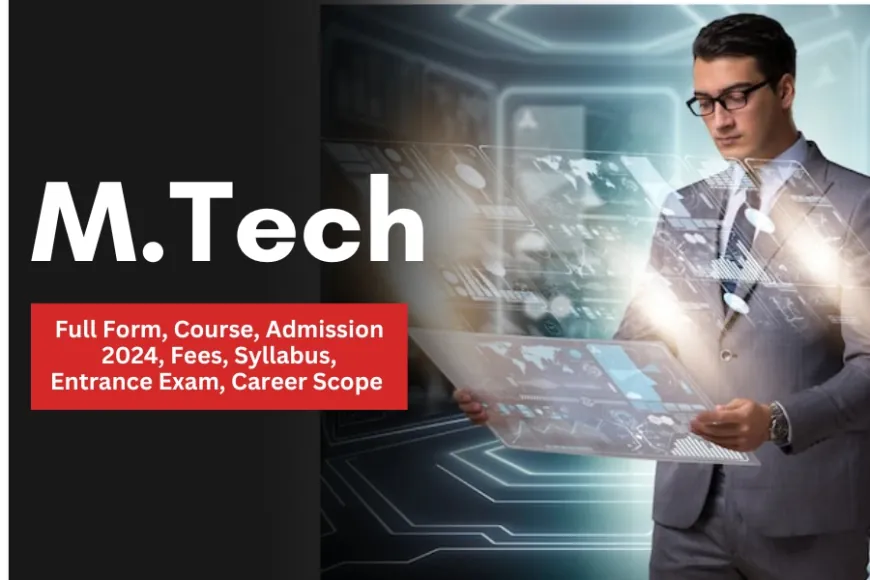M.Tech: Full Form, Admission 2024, Exam & Career Scope
M.Tech (Master of Technology) is a 2-year postgraduate program. Admission in 2024 is through entrance exams like GATE. Graduates have vast career opportunities in tech fields.

The Master of Technology (M.Tech) is a prestigious postgraduate course designed for those looking to gain deeper specialization in various engineering disciplines. This program serves as a critical step for engineering graduates aiming to advance their careers, delve into research, or even transition into academic roles. With a curriculum focused on both theoretical and practical knowledge, M.Tech opens doors to senior roles in industries, research opportunities, and teaching positions in academic institutions.
Why Pursue an M.Tech?
For engineering graduates seeking to elevate their professional standing, an M.Tech degree offers numerous advantages:
- Specialized Knowledge: It allows students to develop a deeper understanding of a specific engineering field, positioning them as experts.
- Research Opportunities: M.Tech provides a solid foundation for those interested in pursuing research or further academic studies like a Ph.D.
- Advanced Career Roles: Graduates can secure senior roles in engineering, research and development (R&D), and technical consultancy positions across various industries.
An M.Tech degree is also highly valued for teaching roles in universities and engineering institutions, making it an ideal choice for those aspiring to academic careers.
M.Tech Admission Process for 2024
Admission to M.Tech programs is primarily based on entrance examinations. The Graduate Aptitude Test in Engineering (GATE) is the most common exam for M.Tech aspirants, though other state-level and university-specific entrance tests like TANCET and AP PGECET are also conducted.
The admission process typically involves the following steps:
- Entrance Examination: Most institutes require a valid GATE score. Other universities may have their own exams.
- Application Form: After entrance exam results, candidates need to apply to their preferred institutes.
- Counseling: Based on exam scores, counseling is conducted where students choose their specialization and college.
- Final Admission: Once the counseling is completed, document verification and fee submission conclude the process.
Important Admission Dates for 2024
- January-February: Application forms for GATE and other exams are released.
- February-March: Entrance exams are conducted.
- April-May: Results are announced.
- May-July: Counseling and admission processes take place.
- August: Academic sessions commence.
Eligibility Criteria for M.Tech
To be eligible for an M.Tech program, candidates must meet specific requirements:
- Bachelor’s Degree: Applicants should hold a B.Tech or BE degree with a minimum aggregate of 50%-60%, depending on the institute.
- GATE Score: A valid GATE score is required for most universities. However, some institutions conduct their own entrance tests.
- Work Experience (Optional): Some institutes offer M.Tech programs for working professionals, where relevant work experience may be considered.
M.Tech for Working Professionals
M.Tech programs are not just for fresh graduates but also for working professionals who want to upskill or shift into managerial or specialized technical roles. These courses are usually part-time, with classes scheduled in the evenings or on weekends to accommodate professional commitments.
Benefits of M.Tech for Working Professionals:
- Career Advancement: The degree can open up higher-level positions in your current organization.
- Increased Earnings: With advanced skills, your earning potential increases significantly.
- Skill Enhancement: Staying updated with the latest technological trends can give you a competitive edge.
M.Tech Specializations
M.Tech offers a wide array of specializations to cater to different branches of engineering. Some popular options include:
- M.Tech in Computer Science Engineering (CSE): Focuses on machine learning, AI, and software development.
- M.Tech in Civil Engineering: Involves advanced studies in structures, transportation, and environmental engineering.
- M.Tech in Electronics and Communication Engineering: Specializes in telecommunications, microelectronics, and embedded systems.
- M.Tech in Mechanical Engineering: Focuses on thermodynamics, robotics, and fluid mechanics.
These specializations allow students to tailor their education to their specific career goals, equipping them with the knowledge to tackle complex technical challenges in their chosen fields.
Career Scope and Job Opportunities After M.Tech
An M.Tech degree is highly sought after by various industries, including IT, telecommunications, civil infrastructure, automotive, and aerospace. The career scope is vast, offering roles such as:
- Senior Engineer: Managing projects, supervising junior engineers, and making key technical decisions.
- R&D Roles: Innovating in fields like aerospace, automotive, and pharmaceuticals.
- Academic Positions: Teaching roles in universities, or even progressing towards a Ph.D. for further academic research.
- Consultant: Providing expert technical guidance to organizations.
- Government Jobs: Working with prestigious organizations like ISRO, DRDO, and BHEL.
For entrepreneurial-minded individuals, M.Tech also provides the technical foundation needed to launch startups in innovative fields.
Conclusion
An M.Tech degree is a transformative step for engineering graduates and professionals alike. With its focus on specialization, research, and hands-on learning, M.Tech not only boosts career prospects but also provides the skills necessary to excel in a rapidly evolving technological landscape. Whether you aim to climb the corporate ladder, contribute to cutting-edge research, or transition into academia, M.Tech is the key to unlocking your full potential.
What's Your Reaction?
 Like
0
Like
0
 Dislike
0
Dislike
0
 Love
0
Love
0
 Funny
0
Funny
0
 Angry
0
Angry
0
 Sad
0
Sad
0
 Wow
0
Wow
0

















































